Saul - The Tragic King Act II
Mike Ervin
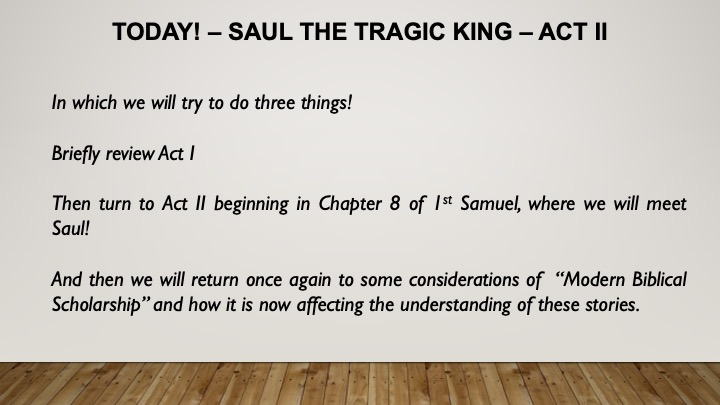
Saul The Tragic King – Act II
In which we will try to do three things!
Briefly review Act II
Then turn to Act II beginning in Chapter 8 of 1st Samuel, where we will meet Saul!
And then we will return once again to some considerations of “Modern Biblical Scholarship” and how it is now affecting the understanding of these stories.
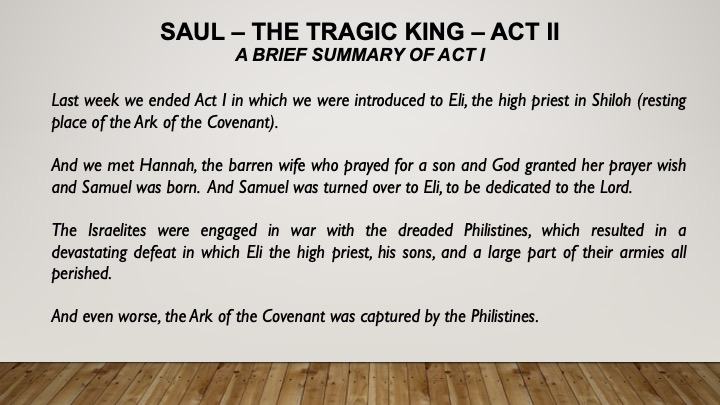
Saul The Tragic King – Act II
Last week we ended Act I in which we were introduced to Eli, the high priest in Shiloh (resting place of the Ark of the Covenant).
And we met Hannah, the barren wife who prayed for a son and God granted her prayer wish and Samuel was born. And Samuel was turned over to Eli, to be dedicated to the Lord.
The Israelites were engaged in war with the dreaded Philistines, which resulted in a devastating defeat in which Eli the high priest, his sons, and a large part of their armies all perished.
And even worse, the Ark of the Covenant was captured by the Philistines.
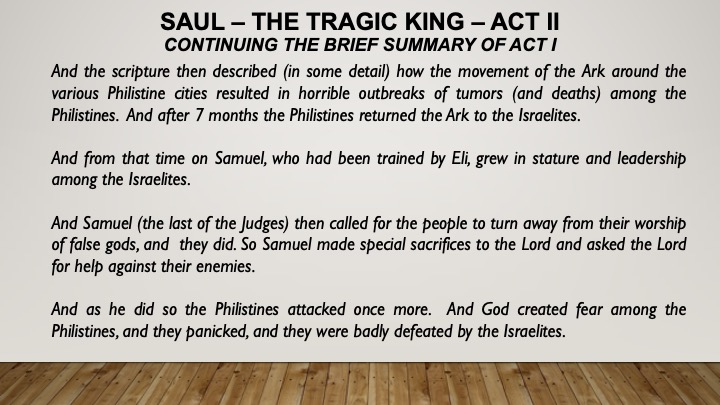
Saul The Tragic King – Act II
And the scripture then described (in some detail) how the movement of the Ark around the various Philistine cities resulted in horrible outbreaks of tumors (and deaths) among the Philistines. And after 7 months the Philistines returned the Ark to the Israelites.
And from that time on Samuel, who had been trained by Eli, grew in stature and leadership among the Israelites.
And Samuel (the last of the Judges) then called for the people to turn away from their worship of false gods, and they did. So Samuel made special sacrifices to the Lord and asked the Lord for help against their enemies.
And as he did so the Philistines attacked once more. And God created fear among the Philistines, and they panicked, and they were badly defeated by the Israelites.
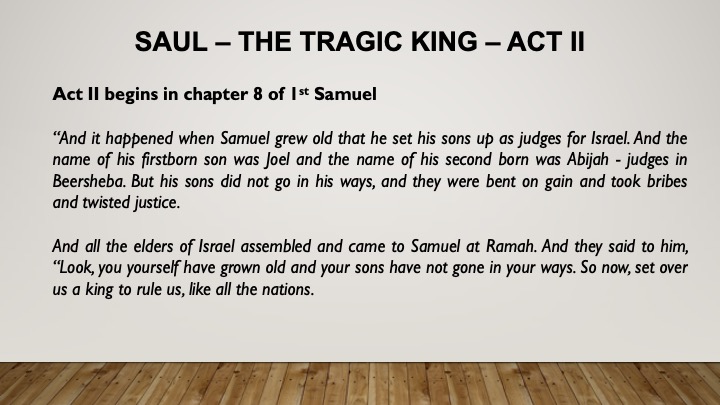
Saul The Tragic King – Act II
Act II begins in Chapter 8 of 1st Samuel
“And it happened when Samuel grew old that he set his sons up as judges for Israel. And the name of his firstborn son was Joel and the name of his second born was Abijah - judges in Beersheba. But his sons did not go in his ways, and they were bent on gain and took bribes and twisted justice.
And all the elders of Israel assembled and came to Samuel at Ramah. And they said to him, “Look, you yourself have grown old and your sons have not gone in your ways. So now, set over us a king to rule us, like all the nations."
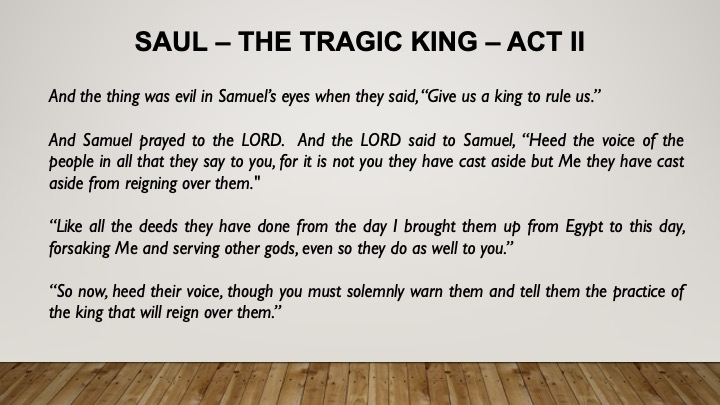
Saul The Tragic King – Act II
And the thing was evil in Samuel’s eyes when they said, “Give us a king to rule us.”
And Samuel prayed to the LORD. And the LORD said to Samuel, “Heed the voice of the people in all that they say to you, for it is not you they have cast aside but Me they have cast aside from reigning over them."
“Like all the deeds they have done from the day I brought them up from Egypt to this day, forsaking Me and serving other gods, even so they do as well to you.”
“So now, heed their voice, though you must solemnly warn them and tell them the practice of the king that will reign over them.”
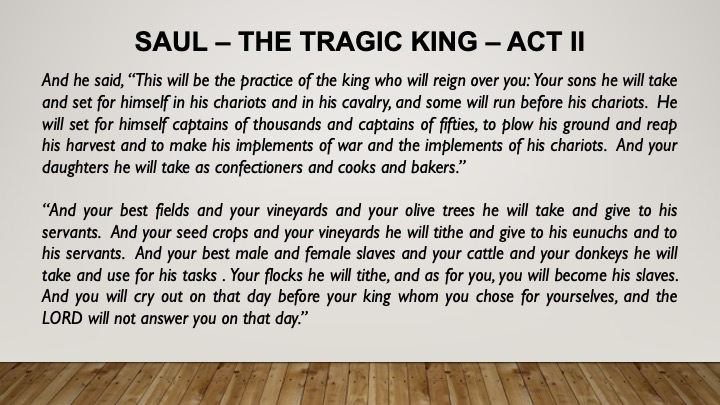
Saul The Tragic King – Act II
And he said, “This will be the practice of the king who will reign over you: Your sons he will take and set for himself in his chariots and in his cavalry, and some will run before his chariots. He will set for himself captains of thousands and captains of fifties, to plow his ground and reap his harvest and to make his implements of war and the implements of his chariots. And your daughters he will take as confectioners and cooks and bakers.”
“And your best fields and your vineyards and your olive trees he will take and give to his servants. And your seed crops and your vineyards he will tithe and give to his eunuchs and to his servants. And your best male and female slaves and your cattle and your donkeys he will take and use for his tasks . Your flocks he will tithe, and as for you, you will become his slaves. And you will cry out on that day before your king whom you chose for yourselves, and the LORD will not answer you on that day.”
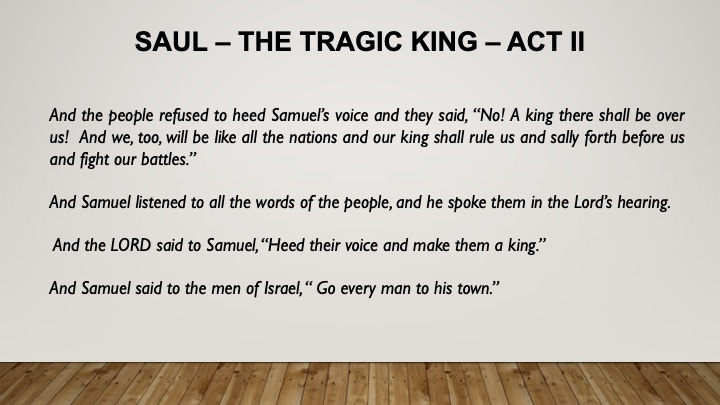
Saul The Tragic King – Act II
And the people refused to heed Samuel’s voice and they said, “No! A king there shall be over us! And we, too, will be like all the nations and our king shall rule us and sally forth before us and fight our battles.”
And Samuel listened to all the words of the people, and he spoke them in the Lord’s hearing.
And the LORD said to Samuel, “Heed their voice and make them a king.”
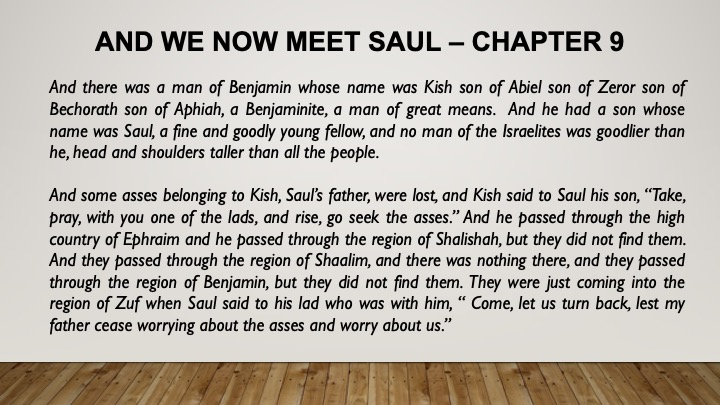
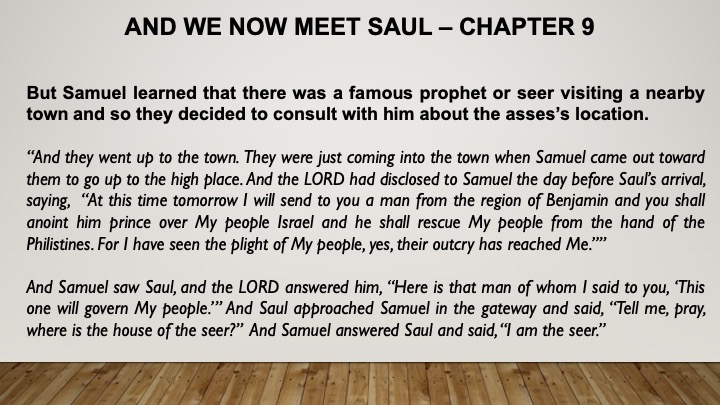
Saul The Tragic King – Chapter 9
But Samuel learned that there was a famous prophet or seer visiting a nearby town and so they decided to consult with him about the asses’s location.
“And they went up to the town. They were just coming into the town when Samuel came out toward them to go up to the high place. And the LORD had disclosed to Samuel the day before Saul’s arrival, saying, “At this time tomorrow I will send to you a man from the region of Benjamin and you shall anoint him prince over My people Israel and he shall rescue My people from the hand of the Philistines. For I have seen the plight of My people, yes, their outcry has reached Me.”
And Samuel saw Saul, and the LORD answered him, “Here is that man of whom I said to you, ‘This one will govern My people.’” And Saul approached Samuel in the gateway and said, “Tell me, pray, where is the house of the seer?” And Samuel answered Saul and said, “I am the seer.”
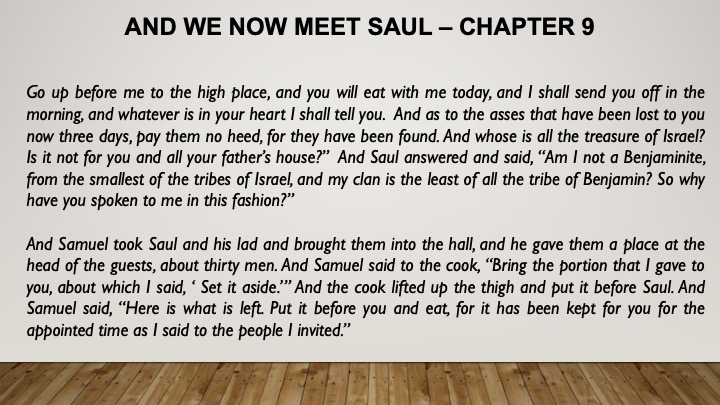
Saul The Tragic King – Chapter 9
Go up before me to the high place, and you will eat with me today, and I shall send you off in the morning, and whatever is in your heart I shall tell you. And as to the asses that have been lost to you now three days, pay them no heed, for they have been found. And whose is all the treasure of Israel? Is it not for you and all your father’s house?” And Saul answered and said, “Am I not a Benjaminite, from the smallest of the tribes of Israel, and my clan is the least of all the tribe of Benjamin? So why have you spoken to me in this fashion?”
And Samuel took Saul and his lad and brought them into the hall, and he gave them a place at the head of the guests, about thirty men. And Samuel said to the cook, “Bring the portion that I gave to you, about which I said, ‘ Set it aside.’” And the cook lifted up the thigh and put it before Saul. And Samuel said, “Here is what is left. Put it before you and eat, for it has been kept for you for the appointed time as I said to the people I invited.”
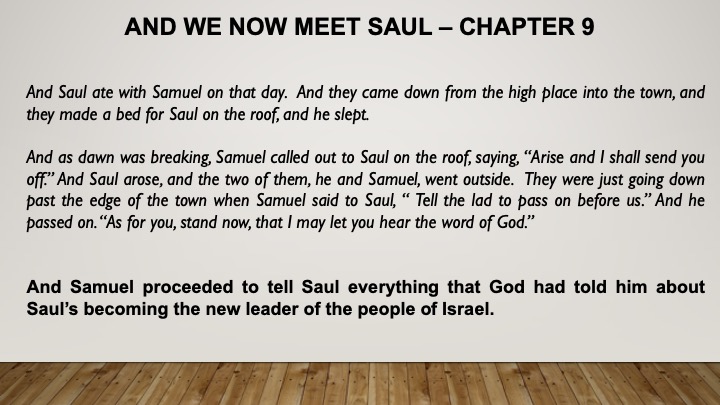
Saul The Tragic King – Chapter 9
And Saul ate with Samuel on that day. And they came down from the high place into the town, and they made a bed for Saul on the roof, and he slept.
And as dawn was breaking, Samuel called out to Saul on the roof, saying, “Arise and I shall send you off.” And Saul arose, and the two of them, he and Samuel, went outside. They were just going down past the edge of the town when Samuel said to Saul, “ Tell the lad to pass on before us.” And he passed on. “As for you, stand now, that I may let you hear the word of God.”
And Samuel proceeded to tell Saul everything that God had told him about Saul’s becoming the new leader of the people of Israel.
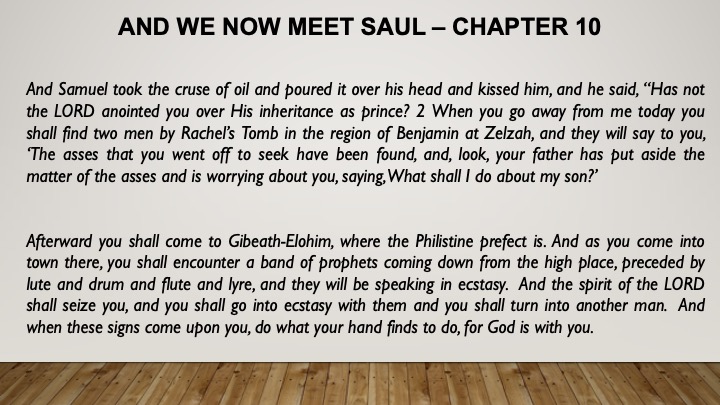
Saul The Tragic King – Chapter 9
And Samuel took the cruse of oil and poured it over his head and kissed him, and he said, “Has not the LORD anointed you over His inheritance as prince? 2 When you go away from me today you shall find two men by Rachel’s Tomb in the region of Benjamin at Zelzah, and they will say to you, ‘The asses that you went off to seek have been found, and look, your father has put aside the matter of the asses and is worrying about you, saying, What shall I do about my son?’
Afterward you shall come to Gibeath-Elohim, where the Philistine prefect is. And as you come into town there, you shall encounter a band of prophets coming down from the high place, preceded by lute and drum and flute and lyre, and they will be speaking in ecstasy. And the spirit of the LORD shall seize you, and you shall go into ecstasy with them, and you shall turn into another man. And when these signs come upon you, do what your hand finds to do, for God is with you.
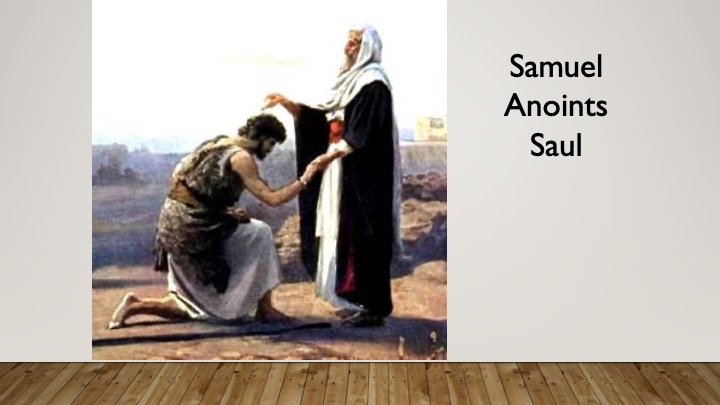
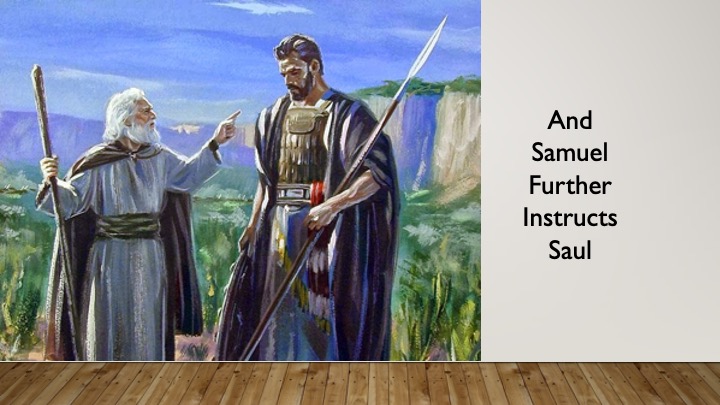
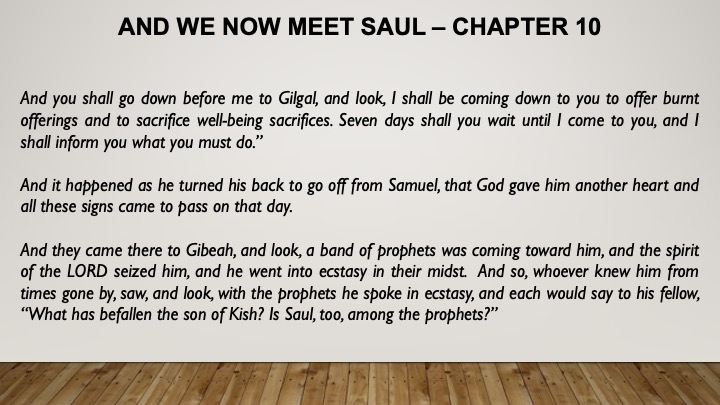
Saul The Tragic King – Chapter 9
And you shall go down before me to Gilgal, and look, I shall be coming down to you to offer burnt offerings and to sacrifice well-being sacrifices. Seven days shall you wait until I come to you, and I shall inform you what you must do.”
And it happened as he turned his back to go off from Samuel, that God gave him another heart and all these signs came to pass on that day.
And they came there to Gibeah, and look, a band of prophets was coming toward him, and the spirit of the LORD seized him, and he went into ecstasy in their midst. And so, whoever knew him from times gone by, saw, and look, with the prophets he spoke in ecstasy, and each would say to his fellow, “What has befallen the son of Kish? Is Saul, too, among the prophets?”
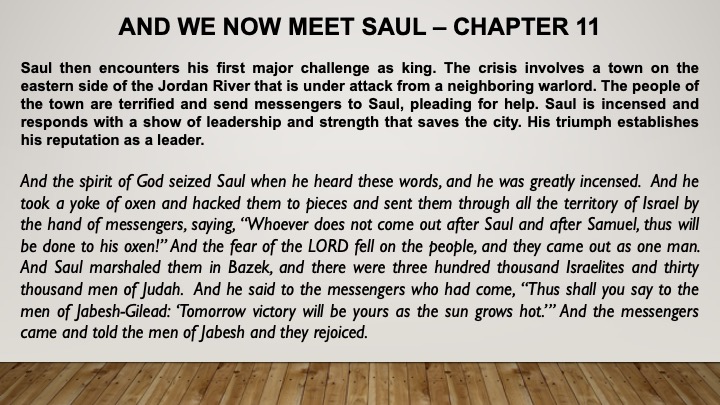
Saul The Tragic King – Chapter 11
Saul then encounters his first major challenge as king. The crisis involves a town on the eastern side of the Jordan River that is under attack from a neighboring warlord. The people of the town are terrified and send messengers to Saul, pleading for help. Saul is incensed and responds with a show of leadership and strength that saves the city. His triumph establishes his reputation as a leader.
And the spirit of God seized Saul when he heard these words, and he was greatly incensed. And he took a yoke of oxen and hacked them to pieces and sent them through all the territory of Israel by the hand of messengers, saying, “Whoever does not come out after Saul and after Samuel, thus will be done to his oxen!” And the fear of the LORD fell on the people, and they came out as one man. And Saul marshaled them in Bazek, and there were three hundred thousand Israelites and thirty thousand men of Judah. And he said to the messengers who had come, “Thus shall you say to the men of Jabesh-Gilead: ‘Tomorrow victory will be yours as the sun grows hot.’” And the messengers came and told the men of Jabesh and they rejoiced.
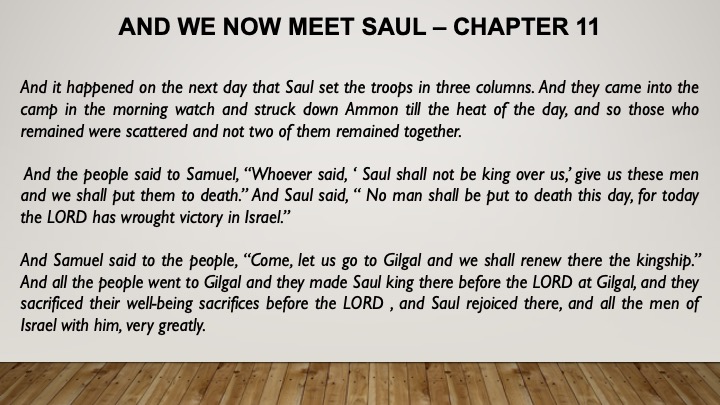
Saul The Tragic King – Chapter 11
And it happened on the next day that Saul set the troops in three columns. And they came into the camp in the morning watch and struck down Ammon till the heat of the day, and so those who remained were scattered and not two of them remained together.
And the people said to Samuel, “Whoever said, ‘ Saul shall not be king over us,’ give us these men and we shall put them to death.” And Saul said, “ No man shall be put to death this day, for today the LORD has wrought victory in Israel.”
And Samuel said to the people, “Come, let us go to Gilgal and we shall renew there the kingship.” And all the people went to Gilgal and they made Saul king there before the LORD at Gilgal, and they sacrificed their well-being sacrifices before the LORD , and Saul rejoiced there, and all the men of Israel with him, very greatly.
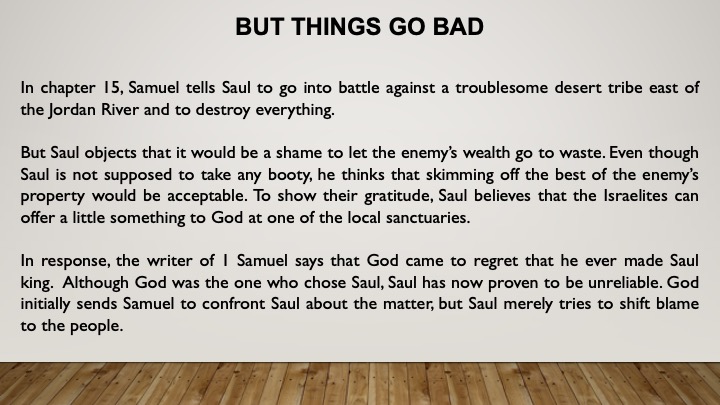
But Things go bad
In chapter 15, Samuel tells Saul to go into battle against a troublesome desert tribe east of the Jordan River and to destroy everything.
But Saul objects that it would be a shame to let the enemy’s wealth go to waste. Even though Saul is not supposed to take any booty, he thinks that skimming off the best of the enemy’s property would be acceptable. To show their gratitude, Saul believes that the Israelites can offer a little something to God at one of the local sanctuaries.
In response, the writer of 1 Samuel says that God came to regret that he ever made Saul king. Although God was the one who chose Saul, Saul has now proven to be unreliable. God initially sends Samuel to confront Saul about the matter, but Saul merely tries to shift blame to the people.
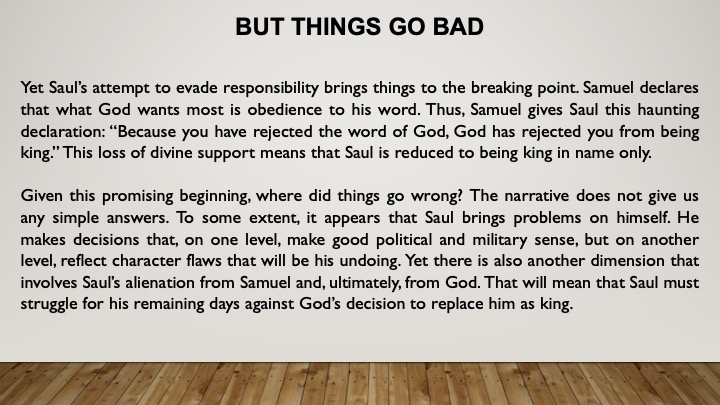
But Things go bad
Yet Saul’s attempt to evade responsibility brings things to the breaking point. Samuel declares that what God wants most is obedience to his word. Thus, Samuel gives Saul this haunting declaration: “Because you have rejected the word of God, God has rejected you from being king.” This loss of divine support means that Saul is reduced to being king in name only.
Given this promising beginning, where did things go wrong? The narrative does not give us any simple answers. To some extent, it appears that Saul brings problems on himself. He makes decisions that, on one level, make good political and military sense, but on another level, reflect character flaws that will be his undoing. Yet there is also another dimension that involves Saul’s alienation from Samuel and, ultimately, from God. That will mean that Saul must struggle for his remaining days against God’s decision to replace him as king.


Deuteronomistic History
The Deuteronomistic History (DH) is a modern theoretical scholarly construct postulating that behind the present forms of the books of Deuteronomy and Joshua, Judges, 1st & 2nd Samuel, and 1st & 2nd Kings there was a single literary work. And significantly, this construct insists that the complete DH was composed during the exilic period soon after the Babylon conquest of Jerusalem in 587 – 586 BCE .
Martin Noth’s published work, in the mid 20th century, has had a huge impact on rethinking a major part of the Hebrew Bible and how and why it was written.
And as you can probably imagine, it raised questions as to why it was written so long after many of these things happened, but also why it was written in the way it was. Painting such a grim story of the failures of so many of the leaders, both the Judges and the kings.
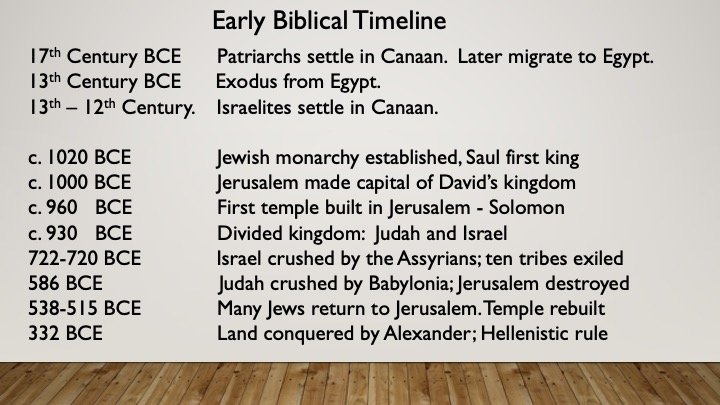
The Early Biblical Timeline
As background, let's remind ourselves of the early biblical timeline. It was all the way back in the 17th century B.C.E. that Abraham, Issac, and Jacob were raising their families in the land of Canaan. And they were forced by famine to migrate to Egypt, where they eventually became slaves. Then in the 13th and 12th centuries we have the stories in Joshua and Judges about the Israelites settling into the Land of Canaan.
Then moving into the times we are now addressing, we see the times for the first three kings of the "United Monarchy", followed by the "Divided Monarchies", which were later destroyed and carried into captivity by the Assyrians and the Babylonians. And later the Persians defeated the Babylonians and allowed many Jews to return to Jerusalem and rebuild the temple, initiating the Second Temple period.
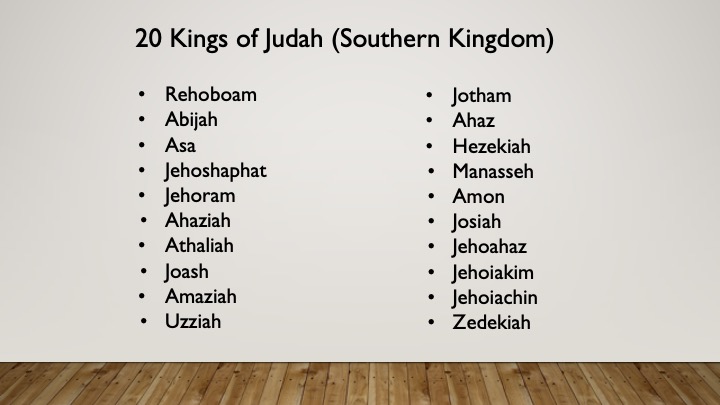
And as a reminder there were 20 kings disclosed in the Southern Kingdom. There will not be a quiz about all of these kings but I want to point out Josiah as an important aspect in these stories that we will talk about later.
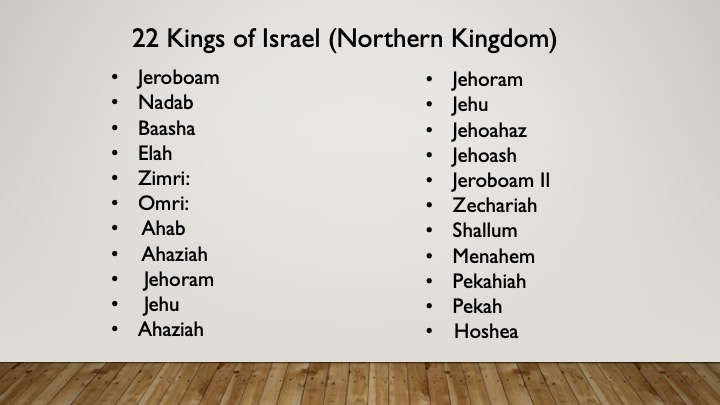
And 22 kings in the northern kingdom. Uniformly described in the biblical stories as "doing evil in the eyes of God". And we will mention now though Jeroboam II as a particularly powerful king in the northern kingdom.
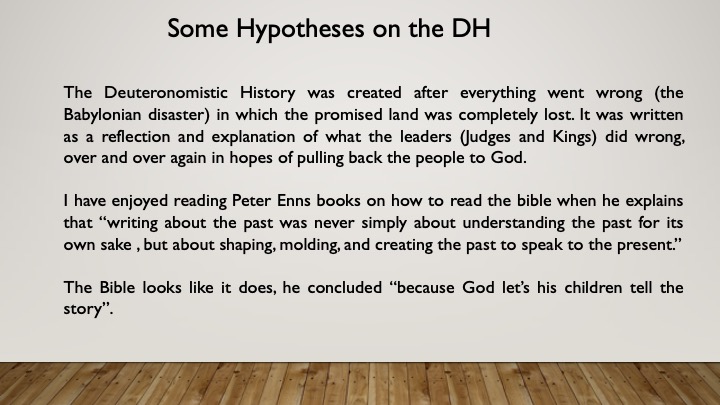
Some Hypotheses on the DH
The Deuteronomistic History was created after everything went wrong (the Babylonian disaster) in which the promised land was completely lost. It was written as a reflection and explanation of what the leaders (Judges and Kings) did wrong, over and over again in hopes of pulling back the people to God.
I have enjoyed reading Peter Enns books on how to read the bible when he explains that “writing about the past was never simply about understanding the past for its own sake , but about shaping, molding, and creating the past to speak to the present.”
The Bible looks like it does, he concluded “because God lets his children tell the story”.
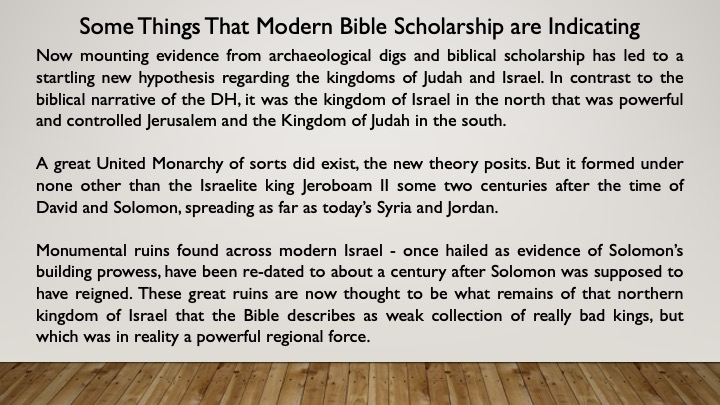
Some Things That Modern Bible Scholarship are Indicating
Now mounting evidence from archaeological digs and biblical scholarship has led to a startling new hypothesis regarding the kingdoms of Judah and Israel. In contrast to the biblical narrative of the DH, it was the kingdom of Israel in the north that was powerful and controlled Jerusalem and the Kingdom of Judah in the south.
A great United Monarchy of sorts did exist, the new theory posits. But it formed under none other than the Israelite king Jeroboam II some two centuries after the time of David and Solomon, spreading as far as today’s Syria and Jordan.
Monumental ruins found across modern Israel - once hailed as evidence of Solomon’s building prowess, have been re-dated to about a century after Solomon was supposed to have reigned. These great ruins are now thought to be what remains of that northern kingdom of Israel that the Bible describes as weak collection of really bad kings, "who did evil in the eyes of God", but which was in reality a powerful regional force. Confirmed by archeology and by newly discovered writings from the surrounding cultures that have been uncovered in modern times.
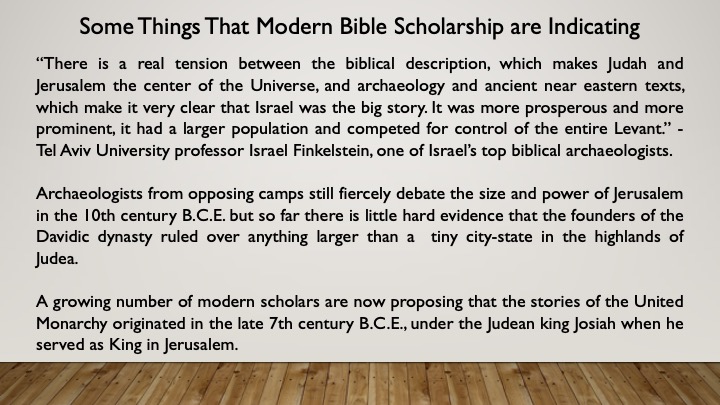
Some Things That Modern Bible Scholarship are Indicating
“There is a real tension between the biblical description, which makes Judah and Jerusalem the center of the Universe, and archaeology and ancient near eastern texts, which make it very clear that Israel was the big story. It was more prosperous and more prominent, it had a larger population and competed for control of the entire Levant.” - Tel Aviv University professor Israel Finkelstein, one of Israel’s top biblical archaeologists.
Archaeologists from opposing camps still fiercely debate the size and power of Jerusalem in the 10th century B.C.E. but so far there is little hard evidence that the founders of the Davidic dynasty ruled over anything larger than a tiny city-state in the highlands of Judea.
A growing number of modern scholars are now proposing that the stories of the United Monarchy originated in the late 7th century B.C.E., under the southern kingdom king Josiah when he served as king in Jerusalem.
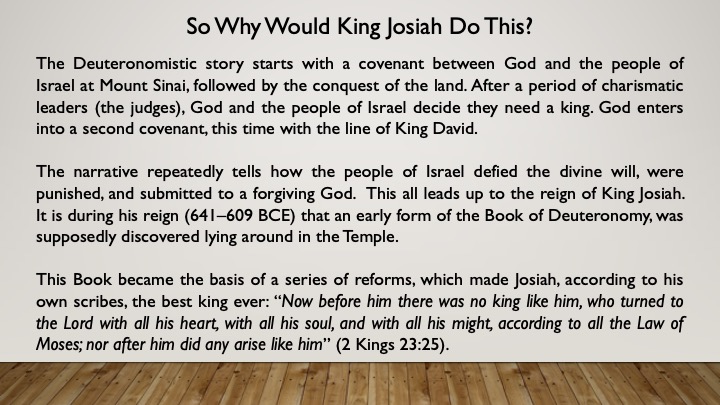
Some Things That Modern Bible Scholarship are Indicating
The Deuteronomistic story starts with a covenant between God and the people of Israel at Mount Sinai, followed by the conquest of the land. After a period of charismatic leaders (the judges), God and the people of Israel decide they need a king. God enters into a second covenant, this time with the line of King David.
The narrative repeatedly tells how the people of Israel defied the divine will, were punished, and submitted to a forgiving God. This all leads up to the reign of King Josiah. It is during his reign (641–609 BCE) that an early form of the Book of Deuteronomy, was supposedly discovered lying around in the Temple.
This Book became the basis of a series of reforms, which made Josiah, according to his own scribes, the best king ever: “Now before him there was no king like him, who turned to the Lord with all his heart, with all his soul, and with all his might, according to all the Law of Moses; nor after him did any arise like him” (2 Kings 23:25).
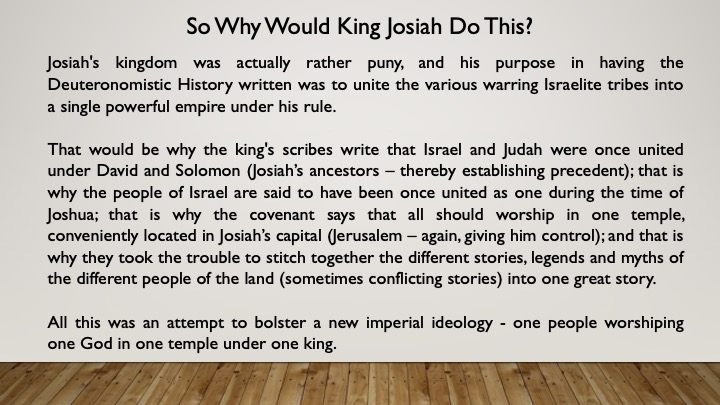
So Why Would King Josiah Do This?
Josiah's kingdom was actually rather puny, and his purpose in having the Deuteronomistic History written was to unite the various warring Israelite tribes into a single powerful empire under his rule.
That would be why the king's scribes write that Israel and Judah were once united under David and Solomon (Josiah’s ancestors – thereby establishing precedent); that is why the people of Israel are said to have been once united as one during the time of Joshua; that is why the covenant says that all should worship in one temple, conveniently located in Josiah’s capital (Jerusalem – again, giving him control); and that is why they took the trouble to stitch together the different stories, legends and myths of the different people of the land (sometimes conflicting stories) into one great story.
All this was an attempt to bolster a new imperial ideology - one people worshiping one God in one temple under one king.
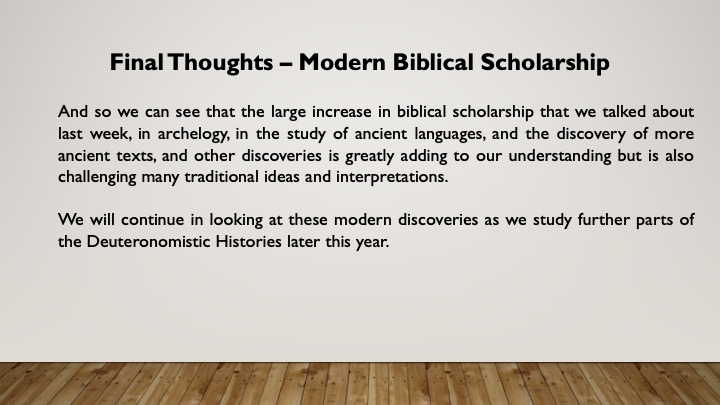
Final Thoughts – Modern Biblical Scholarship
And so we can see that the large increase in biblical scholarship that we talked about last week, in archeology, in the study of ancient languages, and the discovery of more ancient texts, and other discoveries is greatly adding to our understanding but is also challenging many traditional ideas and interpretations.
We will continue in looking at these modern discoveries as we study further parts of the Deuteronomistic Histories later this year.
Next Week
Tune in next week as we tackle Act III of Saul – the Tragic King, and where it really gets tragic.
Act III - Saul’s downfall